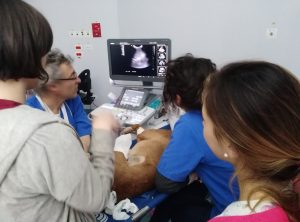Molecular diagnosis of Pneumocystis pneumonia in dogs
Danesi P, Ravagnan S, Johnson LR, Furlanello T, Milani A, Martin P, Boyd S, Best M, Galgut B, Irwin P, Canfield PJ, Krockenberger MB, Halliday C, Meyer W, Malik R.
Molecular diagnosis of Pneumocystis pneumonia in dogs.
Med Mycol. 2017 Feb 23. doi: 10.1093/mmy/myx007
Abstract
Pneumocystis pneumonia (PCP) is a life-threatening fungal disease that can occur in dogs. The aim of this study was to provide a preliminary genetic characterisation of Pneumocystis carinii f.sp.’canis’ (P. canis) in dogs and thereby develop a reliable molecular protocol to definitively diagnose canine PCP. We investigated P. canis in a variety of lung specimens from dogs with confirmed or strongly suspected PCP (Group 1, n = 16), dogs with non-PCP lower respiratory tract problems (Group 2, n = 65) and dogs not suspected of having PCP or other lower respiratory diseases (Group 3, n = 11). Presence of Pneumocystis DNA was determined by nested PCR of the large and small mitochondrial subunit rRNA loci and by a real-time quantitative polymerase chain reaction (qPCR) assay developed using a new set of primers. Molecular results were correlated with the presence of Pneumocystis morphotypes detected in cytological/histological preparations. Pneumocystis DNA was amplified from 13/16 PCP-suspected dogs (Group 1) and from 4/76 dogs of control Groups 2 and 3 (combined). The latter four dogs were thought to have been colonized by P. canis. Comparison of CT values in ‘infected’ versus ‘colonized’ dogs was consistent with this notion, with a distinct difference in molecular burden between groups (CT ≤ 26 versus CT range (26
© The Author 2017. Published by Oxford University Press on behalf of The International Society for Human and Animal Mycology. All rights reserved. For permissions, please e-mail: journals.permissions@oup.com.






 Il Direttore Sanitario Dott. Marco Caldin
Il Direttore Sanitario Dott. Marco Caldin